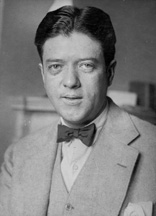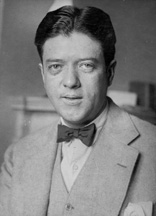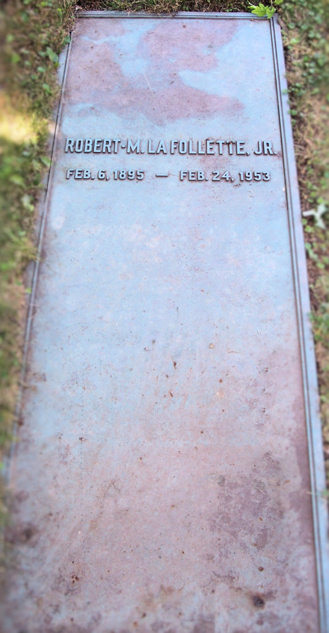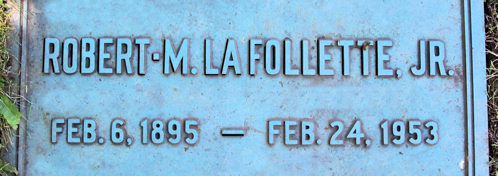US Senator. He served as a Wisconsin Republican US Senator from 1925 to 1946. Born in Madison, Wisconsin, he was the son of Senator Robert Marion La Follette Sr. He attended the University of Wisconsin in Madison from 1913 to 1917 but had to withdraw from college in his senior year due to a severe illness. This same illness prevented him from entering the military during World War I, making him 4-F (unfit for military service). Between 1919 and 1925, he served as a private secretary to his father, then served in the US Senate. In 1930, he married Rachel Wilson Young, and they would have two sons: Joseph Oden La Follette and Bronson Cutting La Follette. "Young Bob," as he was known to his friends, was elected as a Republican to the US Senate on September 29, 1925, to fill the vacancy caused by the death of his father. La Follette was a champion of organized labor and quickly gained national prominence between 1936 and 1940 as Chairman of the special Senate investigating committee, at that time called the La Follette Civil Liberties Committee, which investigated illegal means that employers sometimes used to keep their workers from organizing labor unions. Although a Republican, he generally supported President Franklin D. Roosevelt and most New Deal bills during the Great Depression. An isolationist, he helped to found the America First Committee, which, before the attack on Pearl Harbor, argued strongly to keep the US out of the war in the period from 1939 to 1941. He was reelected in 1928 on the Republican ticket in 1934, and in 1940, he joined the Progressive Party and won reelection as a member of those parties. Returning to the Republican Party, he lost the 1946 election to Joseph McCarthy in the Republican primary by a mere 5,000 votes. After his 1946 defeat, he worked as a foreign aid advisor to the Truman administration. In 1947, he reported his experience with Communist infiltration into congressional committees, and later, the Verona project revealed that four Soviet agents had served on his Civil Liberties Subcommittee. On February 24, 1953, he was found dead of a gunshot wound in his Washington, DC home that was ruled as self-inflicted. Some historians believe that he killed himself out of fear of being called to testify by Senator McCarthy, who was then holding hearings on Communist infiltration of the government, but most historians believe that he succumbed to depression, which had plagued him most of his life.
US Senator. He served as a Wisconsin Republican US Senator from 1925 to 1946. Born in Madison, Wisconsin, he was the son of Senator Robert Marion La Follette Sr. He attended the University of Wisconsin in Madison from 1913 to 1917 but had to withdraw from college in his senior year due to a severe illness. This same illness prevented him from entering the military during World War I, making him 4-F (unfit for military service). Between 1919 and 1925, he served as a private secretary to his father, then served in the US Senate. In 1930, he married Rachel Wilson Young, and they would have two sons: Joseph Oden La Follette and Bronson Cutting La Follette. "Young Bob," as he was known to his friends, was elected as a Republican to the US Senate on September 29, 1925, to fill the vacancy caused by the death of his father. La Follette was a champion of organized labor and quickly gained national prominence between 1936 and 1940 as Chairman of the special Senate investigating committee, at that time called the La Follette Civil Liberties Committee, which investigated illegal means that employers sometimes used to keep their workers from organizing labor unions. Although a Republican, he generally supported President Franklin D. Roosevelt and most New Deal bills during the Great Depression. An isolationist, he helped to found the America First Committee, which, before the attack on Pearl Harbor, argued strongly to keep the US out of the war in the period from 1939 to 1941. He was reelected in 1928 on the Republican ticket in 1934, and in 1940, he joined the Progressive Party and won reelection as a member of those parties. Returning to the Republican Party, he lost the 1946 election to Joseph McCarthy in the Republican primary by a mere 5,000 votes. After his 1946 defeat, he worked as a foreign aid advisor to the Truman administration. In 1947, he reported his experience with Communist infiltration into congressional committees, and later, the Verona project revealed that four Soviet agents had served on his Civil Liberties Subcommittee. On February 24, 1953, he was found dead of a gunshot wound in his Washington, DC home that was ruled as self-inflicted. Some historians believe that he killed himself out of fear of being called to testify by Senator McCarthy, who was then holding hearings on Communist infiltration of the government, but most historians believe that he succumbed to depression, which had plagued him most of his life.
Bio by: Kit and Morgan Benson
Family Members
Advertisement
See more La Follette memorials in:
Records on Ancestry
Advertisement















